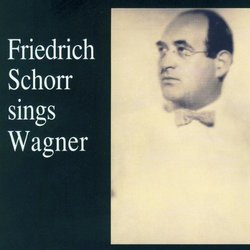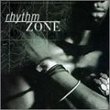| All Artists: Friedrich Schorr, Richard [Classical] Wagner, Leo Blech, Albert Coates, Lawrance Collingwood, Rosario Bourdon, Lawrence, John Barbirolli, Berlin State Opera Orchestra, London Symphony Orchestra, Orchester der Bayerischen Staatsoper, Genia Guszalewicz, Waldemar Henke, Frida Leider, Lauritz Melchior, Rudolf Watzke, Liselotte Topas, Horst R. Laubenthal, Elisabeth Rethberg, Gladys Parr Title: Friedrich Schorr Sings Wagner Members Wishing: 0 Total Copies: 0 Label: Preiser Records Release Date: 6/20/1995 Genre: Classical Styles: Opera & Classical Vocal, Historical Periods, Modern, 20th, & 21st Century Number of Discs: 2 SwapaCD Credits: 2 UPC: 717281892148 |
Search - Friedrich Schorr, Richard [Classical] Wagner, Leo Blech :: Friedrich Schorr Sings Wagner
 | Friedrich Schorr, Richard [Classical] Wagner, Leo Blech Friedrich Schorr Sings Wagner Genre: Classical
|
Larger Image |
CD DetailsSimilar CDs
|
CD ReviewsThe lost art of the Wagnerian Heldenbariton David A. Kemp | Plano, TX USA | 12/15/2001 (5 out of 5 stars) "Friedrich Schorr (1888-1953) was the greatest Wagnerian bass-baritone of the "golden age" of Wagner singing in the inter-war years of the Twenties and Thirties which included Melchior, Leider, Lehmann, Rethberg, and Flagstad. Many good judges consider him the greatest Wagnerian bass-baritone of the twentieth century--his only competition comes from the much earlier Emil Fisher (1838-1914) and perhaps from his contemporary Rudolf Bockelmann (1892-1958). Born in Hungary, he studied in Vienna and Brno, made his debut in Graz as the Die Walkure Wotan in 1912 to great success, earning the novice singer a four-year contract. Then he sang in Prague (1916), Cologne (1918-1923), and the Berlin State Opera (1923-32). He visited New York in 1923 and was engaged by the Metropolitan (debut there in Tannhauser in 1924), where he sang for twenty seasons, most often the great Wagner roles, in which he had no peer; he was especially esteemed for his Dutchman, Hans Sachs, and Wotan. He also appeared frequently at Covent Garden (1924-1933), at Bayreuth (where he was the regular Wotan from 1925-1931), at the Vienna State Opera (1923 and 1929-1936), and in San Francisco (1931-1938). He moved to the U. S. permanently after the rise of the Nazis. Since he retired from the Met in 1943, there has been no one to take his place.The Metropolitan Opera Encyclopedia, ed. David Hamilton, says of him: "Without question the greatest Wagnerian bass-baritone of his time, Schorr was equally impressive in Wotan's scornful rages and Sachs's tenderness; his noble, smooth, resonant voice functioned well at all dynamic levels, and his diction was precise, authoritative, and finely colored. Extensive passages from his major roles are well preserved on recordings." Indeed they are, and we have the best of them here. This marvelous two-CD all-Wagner collection, released in 1994 and containing almost two and a half hours of music (over 73 minutes on each CD), is a feast of exemplary Wagner bass-baritone singing, probably the best ever put on record. The processing and annotation are first-rate, as is typical of the estimable Austrian label Preiser, which with its fine "Lebendige Vergangenheit" ("Living Past") series has done much to preserve and make available the legacy of great singers of the past. The recordings here (1927 to 1931) are all HMV and Victor studio electrical recordings and all represent Schorr in his prime; all are object lessons in how these Wagner roles should be sung. Schorr's Dutchman (Der fliegende Hollander), Wolfram (Tannhauser), and Gunther (Gotterdammerung) are all represented, but the lion's share of the space here goes appropriately to Wotan (Das Rheingold, DieWalkure) and Hans Sachs (Die Meistersinger), his two greatest roles. Some think of Wagner singing as primarily loud, strenuous, and declamatory, and there have been Wagner singers who have fostered this impression. But the greatest Wagner singers give the lie to this notion, and this is nowhere better exemplified than in the singing of Schorr: he has the power for the climaxes and can declaim with authority, but what impresses most is the smoothness of his legato, the mellifluous ease and naturalness of his vocal production throughout his range and at varying dynamic levels, the absence of strain in his singing. He makes it sound as natural and easy as opening his mouth. His singing is wonderfully expressive, but he makes all his dramatic points by purely vocal means. "O du mein holder Abendstern" from Tannhauser is as close to a traditional Italian aria as Wagner's operas provide, and Schorr's caressing performance of it is as close as Wagnerian singing comes to bel canto. Collateral benefits in this set include some other superb Wagnerians: the great Frida Leider in several selections from Die Walkure (including her thrilling Brunnhilde's Battle Cry), Lauritz Melchior, Elisabeth Rethberg, and a stunningly beautiful Die Meistersinger quintet in which the hauntingly lovely singing of Elisabeth Schumann (she sings with instrumental precision and control) floats magically above the other voices. If you are interested in the great Wagner singers, in the history of Wagnerian singing, or if you simply want to hear how these roles can sound in their optimum interpretations, this set is indispensable. No one sang these roles better than Schorr, and for the last sixty years no one has sung them as well."
|

 Track Listings (11) - Disc #1
Track Listings (11) - Disc #1
